|
|
|
Sort Order |
|
|
|
Items / Page
|
|
|
|
|
|
|
| Srl | Item |
| 1 |
ID:
179019
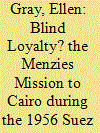

|
|
|
|
|
| Summary/Abstract |
This analysis questions the dominant view of the role played by Australian Prime Minister Robert Menzies in the early stages of the 1956 Suez Canal crisis. Tasked with the responsibility of discussing a peaceful settlement to the crisis with Egyptian President, Gamal Abdel Nasser, Menzies’ mission to Cairo failed. Previous accounts overwhelming consign the collapse to Menzies’ blind loyalty to the British Empire. However, the reasons for the negative outcome were more complex. Rather than merely acting out of devotion to Britain, Menzies also placed significant importance on United States policy, causing him to miscalculate the international political climate. Additionally, other factors like the divide between Menzies and Nasser’s ideological beliefs, Menzies’ legal background, and his wartime experiences shaped the outcome of the discussions. However, failure lays not solely with Menzies. The actions of other Powers also affected the proceedings; in particular, American and British hidden agendas and on-going Anglo-French military operations helped seal the fate of Menzies’ mission.
|
|
|
|
|
|
|
|
|
|
|
|
|
|
|
|
| 2 |
ID:
112107
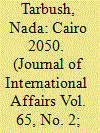

|
|
|
|
|
| Publication |
2012.
|
| Summary/Abstract |
Since the late 1960s, Cairo's urban development has been characterized by a rapid expansion of densely populated informal settlements ('ashwa'iyyat) that now house more than 60 percent of Cairo's population. In 2008, the Egyptian government began promoting Cairo 2050, a grandiose "vision" that aims to counter this phenomenon and transform Cairo into a global city like Paris or Tokyo. This article shows that attempts to redirect Cairo down this path of modernization would fail to resolve the city's urban challenges because they ignore realities on the ground. The article argues that informality and its associated high population density have offered solutions-though they are suboptimal-to resolving Cairo's urban challenges, and that implementing modernity from above will create more problems than solutions.
|
|
|
|
|
|
|
|
|
|
|
|
|
|
|
|
| 3 |
ID:
149756


|
|
|
|
|
| Summary/Abstract |
Official crime data are improving in reliability. Hugo Foster examines how it can be layered with other analytical inputs to provide a granular assessment of risk at a sub-city level.
|
|
|
|
|
|
|
|
|
|
|
|
|
|
|
|
| 4 |
ID:
122591


|
|
|
|
|
| Publication |
2013.
|
| Summary/Abstract |
Nine days after the victory in the Six Day War the Israeli cabinet adopted a resolution which seemingly offered Egypt and Syria the territories they had just lost in exchange for contractual peace. In public and academic discourse the resolution has been presented as a 'generous peace offer' which was transmitted to Cairo and Damascus through the United States and was immediately rejected. The article demonstrates that the 'generous peace offer' was never offered to the Arabs. The cabinet resolution was mainly a diplomatic manoeuver whose aim was to gain American political support against a Soviet move at the United Nations for immediate and unconditional Israeli withdrawal from the territories occupied in the war. The article argues that Abba Eban, Israel's foreign minister at the time, created the myth of the 'generous peace offer' and that it has been turned into an accepted wisdom by dozens of writers and scholars who have recycled Eban's story unchallenged.
|
|
|
|
|
|
|
|
|
|
|
|
|
|
|
|
| 5 |
ID:
092059
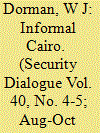

|
|
|
|
|
| Publication |
2009.
|
| Summary/Abstract |
From the late 1980s, Islamist militants established a 'state within the state' in the Egyptian capital Cairo, situated in 'informal' neighbourhoods developed without official authorization, planning or public services. After government security forces in late 1992 crushed these efforts in the neighbourhood of Munira Gharbiyya, informal Cairo became pathologized in public discourse as ashwa'iyyat ('random' or 'haphazard' areas), a zone of socio-spatial disorder threatening Egypt as a whole and demanding state intervention. However, this securitizing move did not lead to heavy-handed intervention against informal Cairo more generally. Following the suppression of the militants, the Mubarak government instead returned to long-term patterns of indifference and neglect that had allowed informal neighbourhoods to flourish since the 1960s. In part, the absence of intervention can be explained in terms of resource constraints and risk avoidance. More profoundly, however, it reflects numerous linkages between informal urbanization and the Egyptian state. The ashwa'iyyat are, to a significant degree, both a consequence of an authoritarian political order and embedded in the informal control stratagems used by Egyptian governments to bolster their rule. Informal Cairo should thus not be understood as a disorderly zone of subaltern dissidence. Rather, the Egyptian state is best seen as facing its own oblique reflection.
|
|
|
|
|
|
|
|
|
|
|
|
|
|
|
|
| 6 |
ID:
151850
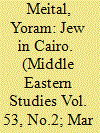

|
|
|
|
|
| Summary/Abstract |
This article is the first to expound on Chehata Haroun's personality, his beliefs, and the implications thereof, all of which will be scrutinized within the context of the national and political transformations that convulsed the Land of the Nile, especially its Jewish community, from the late 1940s onwards. For the most part, the emphasis will be on three strands of the activist's critical views of the Middle East. The first is his claim that the Zionist movement and the Arab leadership are jointly responsible for the asphyxiation of Egyptian Jewry. This argument was promulgated in a letter that he addressed to President Gamal ᶜAbd al-Nasser in February 1967. The second strand is that Haroun's Jewishness does not contradict his Egyptian national identity, his uncompromising devotion to communism and humanism, ardent opposition to imperialism, or his identification with the Palestinian cause. The third contention is that the Jewish community and its heritage constitute an indivisible part of the Egyptian social and cultural fabric.
|
|
|
|
|
|
|
|
|
|
|
|
|
|
|
|
| 7 |
ID:
111931
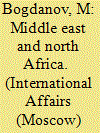

|
|
|
| 8 |
ID:
001121
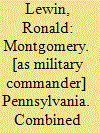

|
|
|
|
|
| Publication |
Pennsylvania, Combined Publishing, 1998.
|
| Description |
xiii, 288p.: maps.Pbk
|
| Standard Number |
0938289179
|
|
|
|
|
|
|
|
|
|
|
|
Copies: C:1/I:0,R:0,Q:0
Circulation
| Accession# | Call# | Current Location | Status | Policy | Location |
| 040571 | 923.5/LEW 040571 | Main | On Shelf | General | |
|
|
|
|
| 9 |
ID:
140359
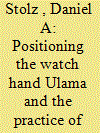

|
|
|
|
|
| Summary/Abstract |
This article explores the role of the ʿulamaʾ in shaping the use of mechanical timepieces in Cairo in the 18th and 19th centuries. Ottoman interest in new technologies in this period is often understood in relation to the emergence of modernization projects and new scientifically trained actors, with a corresponding decline in the status of the ʿulamaʾ. However, the vogue of mechanical timepieces in Cairo allowed ʿulamaʾ trained in the very old tradition of mīqāt (astronomical timekeeping) to make their knowledge speak in new ways to new audiences. Based on several manuals and tables that such scholars wrote “on the position of the watch hand,” this article shows how ʿulamaʾ not only facilitated distinctively Ottoman timekeeping conventions, but also furthered an understanding of watches as instruments of precision. The article builds on a growing literature on Ottoman temporality, while expanding our historical view of ʿulamaʾ and their authority, of the material culture of Cairo, and of science and technology in an Islamic context.
|
|
|
|
|
|
|
|
|
|
|
|
|
|
|
|
| 10 |
ID:
114133
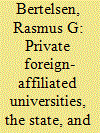

|
|
|
|
|
| Publication |
2012.
|
| Summary/Abstract |
This article contributes to the understanding of the soft power of private foreign-affiliated universities and the interaction between such universities and the state for university soft power and national soft power. The analysis shows university soft power in their Middle East host societies and its basis of academic excellence and biculturalism. Historically, university soft power has been limited first by proselytizing and later by unpopular American foreign policy. The universities have previously undescribed reverse university soft power in the USA on behalf of the Middle East: advocating Middle East interests and raising moral, political, and financial support for education, healthcare, and development in the region. The USA has pursued national soft power through the American University of Beirut and the American University in Cairo since the 1950s. University soft power has been furthered by US government financial assistance to academic excellence, while too close association with the US government has threatened university soft power. The universities have contributed to the national soft power of the USA concerning milieu goals of attraction to education, language, and liberal norms among elites. The universities have not contributed to national soft power regarding the acceptance of unpopular US foreign policies in the Middle East, which was also not a university or US government goal.
|
|
|
|
|
|
|
|
|
|
|
|
|
|
|
|
| 11 |
ID:
144971
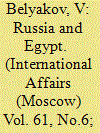

|
|
|
|
|
| Summary/Abstract |
IN AUGUST 2015, one more page was written in the dynamic history of Russian-Egyptian relations. Egyptian President Abdel Fattah al-Sisi paid an official visit to Moscow on August 24-25. He held negotiations with Russian President Vladimir Putin on a wide range of subjects, both bilateral issues and aspects of the situation in the Middle East in general.
|
|
|
|
|
|
|
|
|
|
|
|
|
|
|
|
| 12 |
ID:
167661


|
|
|
|
|
| Summary/Abstract |
This article investigates how commemorating practices are deployed to fix and affirm sovereignty and its ordering. Through conceptualizing commemorating practices as ‘national symbolic order’, this article focuses on Cairo’s monument of the Unknown Soldier as a tangled cluster of shifting attempts to signify urban space. Built shortly after the 1973 war, the monument expressed an approach to nationalist symbolism that was in line with how the Sadat regime came into its own because of the war. The article traces the influences on the style of the monument and the narrative of its construction. Ironically, six years later, the same monument became the resting place of Sadat after his assassination on the same site. How is urban space implicated in the construction of a national symbolic order? How is politics as death and mortality navigated and scripted in city space? In answering these questions, the article relies on interviews with the designer of the post-independence Monument of the Unknown Soldier conducted in 2015 and 2016, and his photographic collection. It proceeds in four sections discussing the significance of the October war of 1973 in shoring up the legitimacy of Sadat, imagining the monument, constructing the monument and, finally, the monument’s mediation of death and sovereignty. From the materiality and entanglements of one site, the article analyzes ‘state-making’ via ‘city-making’ after 1952 and well into 1970s. Ultimately, it follows the hesitations of deploying a national symbolic order in post-independence Egypt and of attempts at shoring up a shaky state apparatus in a common political space.
|
|
|
|
|
|
|
|
|
|
|
|
|
|
|
|
| 13 |
ID:
148277
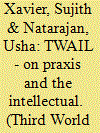

|
|
|
|
|
| Summary/Abstract |
This Special Issue emerges from the Third World Approaches to International Law (TWAIL) Cairo Conference in 2015 and addresses the conference theme, ‘On Praxis and the Intellectual’, by focusing on different aspects of the intellectual as a political actor. In introducing this Issue, we provide some background to the TWAIL network, movement, event, and publications; and delineate our own understandings of scholarly praxis as editors and conference organisers. Broadly, we understand praxis as the relationship between what we say as scholars and what we do – as the inextricability of theory from lived experience. Understood in this way, praxis is central to TWAIL, as TWAIL scholars strive to reconcile international law’s promise of justice with the proliferation of injustice in the world it purports to govern. Reconciliation occurs in the realm of praxis and TWAIL scholars engage in a variety of struggles, including those for greater self-awareness, disciplinary upheaval, and institutional resistance and transformation.
|
|
|
|
|
|
|
|
|
|
|
|
|
|
|
|
| 14 |
ID:
139712


|
|
|
| 15 |
ID:
109775
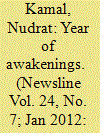

|
|
|
|
|
|
|
|